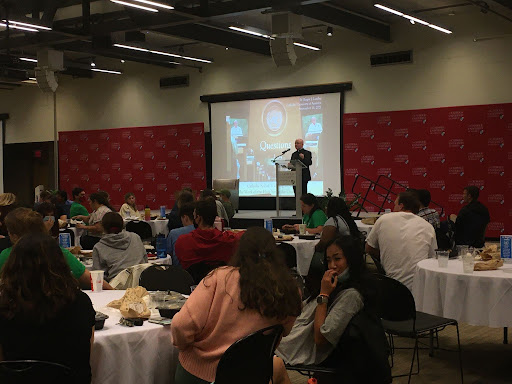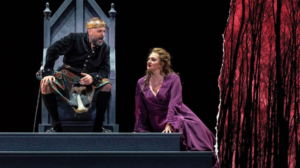First CUA on Tap Features Fr. Landry of the United Nations

Image Courtesy of Anna Harvey
By Anna Harvey
On Thursday, September 16, 2021, Campus Ministry held their first CUA on Tap for the 2021-22 academic year. The evening commenced with an Italian dinner, followed by a talk from Fr. Roger Landry, a Permanent Observer for the Holy See at the United Nations.
Landry explained that his role at the UN consisted of representing the Holy See on world matters, particularly those that concern Catholic Social Teaching. Landry stated that the Holy See’s presence in the UN often garners criticism from both sides of the political spectrum and that many do not believe that a religious body should be present in the UN. He clarified, however, that even from the UN’s creation, the Holy See has always been involved and obtained Permanent Observer Status in 1964. In 2002, Landry said that the Holy See was offered a voting position, but Pope St. John Paul II declined. Currently, the Holy See has all rights of member states, minus the right to vote and submit resolutions.
“We are involved mostly with articulating the ethical principles that need to be underneath the social and political order, based on recognizing universally applicable principles that are as real as the physical elements of the universe,” Landry said.
Moreover, Landry explained the Biblical grounds for the Church’s involvement in this international body. He used Biblical imagery, such as the “salt of the earth”, “light of the world”, and leavening to emphasize the importance of the Church carrying out its mission of upholding human rights on an international scale.
In explaining the Holy See’s work within the UN and Catholic Social Teaching, Landry emphasized four areas of overlap. First, the Holy See endeavors to save succeeding generations from war. The Holy See also reaffirms faith in human rights and the dignity of the human person, both born and unborn. Third, the Holy See seeks to establish conditions within the governing body under which justice and respect for international obligations to be upheld. Finally, the Holy See promotes a standard of social progress to implement a better standard of living among all in the world.
Landry also explained how the Holy See, through instructing the UN, tries to maintain peace by opposing nuclear weapons and taking action to stand up to warmongering countries. Moreover, Landry clarified, according to the Church’s teachings on war, if a government in a war-torn country refuses to help its persecuted populations, surrounding nations have the right to invade to stop such persecution, or the international community may also respond.
Landry elaborated on the Church’s position on important topics that often divide the UN, such as the environment, abortion, asylum of refugees, and religious freedom.
“When Pope Francis was coming,” Landry said, “there were a whole bunch of diplomats in the UN who [did] not like us, because we monkey-wrench their desire to drive an abortion regime and force it down developing countries [throats], totally against their culture… So the Church has got to remind the world—many of which would prefer to look the other way—[that] there is a slaughter happening in the womb.”
Landry also stated that the Holy See strives to ensure that the UN remains firm in its mission to enforce peace; it also encourages member nations to live up to the responsibility to protect vulnerable populations. In particular, he specified how developed nations such as the US must uphold the rights of migrants and refugees and recognize the human dignity inherent in each individual.
“We do have to start with the fact that we’re dealing with human beings here,” Landry said, “and if we wouldn’t do it to our brother and sister—my brother and sister—if we wouldn’t do it to Jesus, Mary, and Joseph, how can we do it to anybody else, when Jesus said, ‘I was a stranger, and you welcomed me in’?”
The talk resonated with many in the student body. Senior politics and theology major Kelsey Nowack reflected on Landry’s emphasis on the intersection of politics and theology.
“I really enjoyed Fr. Landry’s talk!” Nowack said. “As someone who studies the relationship between politics and theology, I loved hearing about the Holy See’s role in the United Nations. In a Church where questions of faith and Catholic Social Teaching feel more divided than ever, it was great to hear how the two work in tandem on the international stage.”
Landry is the author of the popular Catholic devotional Plan of Life. More information about Landry’s mission can be found here.






